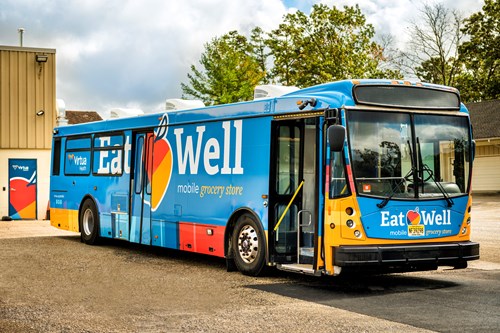RISE’s annual summit will be held as a hybrid event on June 14-15, with preconference workshops on Friday, June 11. Whether attending virtually via livestream or in-person in Nashville, participants will hear from cross-sectional thought leaders driving change in the transition to value-based care. Here’s an inside look at some of this year’s anticipated sessions.
How one health system launched a community-centered food access program
Virtua Health’s food access programs consist of a three-pronged approach: a mobile farmers market, two “food farmacies,” and its newest food access intervention, a mobile grocery store. In a unique case study, April Schetler, MS, RD, FAND, assistant vice president, community health engagement, Virtua Health, will share an in-depth look at the “how-to” behind the organization’s “Eat Well Mobile Grocery Store” launched in February.
 The one aisle grocery store on wheels aims to serve affordable housing communities in south New Jersey by breaking down barriers to access and the high cost of groceries that people face just trying to put food on their table, explained Schetler, pictured right. The mobile store brings fresh, healthy, affordable groceries right outside people’s homes in both urban and rural areas. “We’re there the same time, same day, all year around so that they can depend on us,” said Schetler.
The one aisle grocery store on wheels aims to serve affordable housing communities in south New Jersey by breaking down barriers to access and the high cost of groceries that people face just trying to put food on their table, explained Schetler, pictured right. The mobile store brings fresh, healthy, affordable groceries right outside people’s homes in both urban and rural areas. “We’re there the same time, same day, all year around so that they can depend on us,” said Schetler.
The mobile grocery store (pictured below), which has received SNAP authorization, carries fresh produce, meat, dairy, pantry staples, frozen items, and household goods at significantly reduced prices. “We’ve become their grocery store, which was absolutely the plan, but to see it now come to life is just awesome.”

During her presentation, Schetler will share an eye-opening comparison of what shoppers can purchase with $14 in the mobile grocery store versus how much the same items would cost across four local stores. “The price difference is astonishing,” she said.
While creating a mobile grocery store was new territory for the health system, Schetler credits Virtua Health’s dedication to its mission–to help individuals be well, get well, and stay well–for the successful and swift implementation of its “Eat Well” initiative to support nutrition as a foundation of a healthy lifestyle.
“I think as long as the community is receptive to us, the sky is the limit.”
Schetler will present “Spotlight on food access: How one health system bridged data, stories, and people to launch a community-centered food access program,” at 12:15 p.m. EST on Tuesday, June 15, the second day of The RISE Summit on Social Determinants of Health.
How the Tennessee Department of Health is addressing SDoH through primary prevention
The Tennessee Department of Health’s Office of Primary Prevention aims to address social determinants of health (SDoH) in Tennessee communities through grant funding, partnerships at the state and local level, and cross-sector collaboration.
In an SDoH update from the health department, Shannon Velasquez, built environment coordinator, and John Vick, Ph.D., MS, evaluation and assessment director, office of primary prevention, will discuss their strategies to developing healthy communities.
 “People will make choices based off the choice they have, so if you design a healthy built environment, you make the healthy choice the easy choice,” said Velasquez, pictured left. To ensure communities have the healthy spaces needed to provide opportunities for physical activity and access to healthy foods, the Tennessee Department of Health launched a noncompetitive grant program in 2017, granting $10,000 to all rural counties. The program has since grown to a competitive grant process in which applicants can apply for up to $85,000, with scoring criteria strongly focused on community involvement and engagement.
“People will make choices based off the choice they have, so if you design a healthy built environment, you make the healthy choice the easy choice,” said Velasquez, pictured left. To ensure communities have the healthy spaces needed to provide opportunities for physical activity and access to healthy foods, the Tennessee Department of Health launched a noncompetitive grant program in 2017, granting $10,000 to all rural counties. The program has since grown to a competitive grant process in which applicants can apply for up to $85,000, with scoring criteria strongly focused on community involvement and engagement.
The 2020 grant cycle received roughly 160 letters of intent and closed with the program funding 14 projects up to $85,000, totaling $863,000 distributed. The projects selected, which are scheduled to begin in July, were comprised of distressed counties with built environment needs directly related to SDoH, such as areas without safe spaces to walk or bike for physical activity or active transportation.
In addition to the grant program, the Tennessee Department of Health employs seven regional healthy development coordinators located throughout the state to act as liaisons in community meetings to ensure discussions around planning and zoning of cities consider the health, equity, and SDoH of residents. “Coordinators make sure that when these community meetings are taking place, health has a spot at the table,” said Velasquez.
 Beyond the built environment department, the Office of Primary Prevention takes a similar approach in their involvement in state policies. “In some way, all the policies that are being made in all various sectors and areas of focus are impacting health, whether it’s positive or negative,” said Vick, pictured right. “So, the better connected we are to others outside of the public health world, the better we’re able to help make sure that we are crafting policies and part of policy discussions so that we’re improving health and not harming health.”
Beyond the built environment department, the Office of Primary Prevention takes a similar approach in their involvement in state policies. “In some way, all the policies that are being made in all various sectors and areas of focus are impacting health, whether it’s positive or negative,” said Vick, pictured right. “So, the better connected we are to others outside of the public health world, the better we’re able to help make sure that we are crafting policies and part of policy discussions so that we’re improving health and not harming health.”
To ensure cross-sector collaboration and communication, the Office of Primary Prevention launched the Tennessee Livability Collaborative, a statewide voluntary group of 20 different state agencies, departments, and commissions. “The idea is the better connected we are, stronger relationships we have, the more we see interconnectivity between our work, the more likely we are to be able to make a difference,” said Vick.
The office also oversees county primary prevention plans across all 95 counties in Tennessee, which the health departments create annually to institutionalize SDoH efforts. During the conference presentation, Vick will share what some of these plans consist of and emerging work ahead.
Velasquez and Vick will present “Tennessee Department of Health: Addressing the social determinants of health through primary prevention,” at 3:05 p.m. EST on Monday, June 14, the first day of The RISE Summit on Social Determinants of Health, which will be held as a hybrid event on June 14-15, with preconference workshops on Friday, June 11. Click here to learn more, including the full agenda and registration information.
